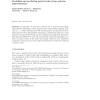Free Online Productivity Tools
i2Speak
i2Symbol
i2OCR
iTex2Img
iWeb2Print
iWeb2Shot
i2Type
iPdf2Split
iPdf2Merge
i2Bopomofo
i2Arabic
i2Style
i2Image
i2PDF
iLatex2Rtf
Sci2ools
181
click to vote
SOCO
2016
Springer
2016
Springer
Modelling and predicting partial orders from pairwise belief functions
Abstract In this paper, we introduce a generic way to represent and manipulate pairwise information about partial orders (representing rankings, preferences, . . . ) with belief functions. We provide generic and practical tools to make inferences from this pairwise information, and illustrate their use on the machine learning problems that are label ranking and multi-label prediction. Our approach differs from most other quantitative approaches handling complete or partial orders, in the sense that partial orders are here considered as primary objects and not as incomplete specifications of ideal but unknown complete orders.
Related Content
| Added | 09 Apr 2016 |
| Updated | 09 Apr 2016 |
| Type | Journal |
| Year | 2016 |
| Where | SOCO |
| Authors | Marie-Hélène Masson, Sébastien Destercke, Thierry Denoeux |
Comments (0)

